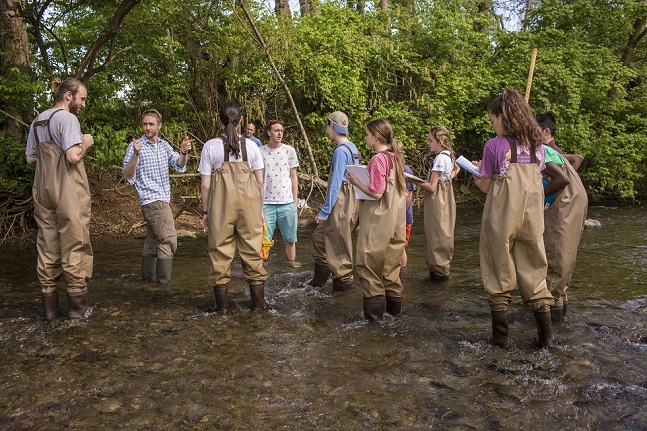Teaching

Dynamic Earth Class- Stream Samples at Richland Creek
Vanderbilt University
Photo: Anne Rayner; VU
EES 1510 The Dynamic Earth: Introduction to Geological Sciences
Processes that have changed the earth. Relation between these processes and their products (e.g., earthquakes, minerals and rocks, mountains, oceanic features); interactions between processes affecting the solid, liquid, and gaseous components of earth; impact on humans.
EES 3340/5340 Structural Geology and Rock Mechanics
Principles of rock deformation from microscopic to mountain range scale. Topics include analysis of stress and strain, mechanisms of deformation, and the geometry of faulting and folding. Analysis of the geologic history of selected regions through interpretation of geologic maps and construction of cross sections. Applications to various tectonic environments. Field trips.
EES 3891/5891 Special Topics- Applied Structural Geology and Tectonics
Techniques for interpreting structural geometry and timing in a variety of tectonic settings. Applications to natural resources, basin evolution, and surface-tectonic feedbacks. Methods include fault and fold kinematic modeling, balanced cross sections, thermochronology, tectonic geomorphology, and interpretation of seismic reflection data. Students will gain experience using software packages for seismic interpretation and for structural modeling. Class format will include lectures, readings with discussion, problem sets, and integrated projects. Prerequisite: Structural Geology (EES 3340)
EES 4996 Senior Honors Seminar
Training in research methods, scientific writing, and science communication. Activities support work toward senior honors research projects, funding requests, honors theses, and oral presentations.
MLAS 6500 Understanding Natural Disasters
Natural disasters seem to dominate the headlines every day, appearing to strike at random and leaving devastating impacts of damage and loss of life. These events and the geologic cycles of which they are part constantly re-shape the world around us, simultaneously contributing to both a habitable and hazardous environment. This course will examine a wide variety of natural disasters, ranging from earthquakes and volcanoes to floods and hurricanes. We will study the causes of each in detail and the settings where they typically occur, as well as preventative measures and predictive capabilities. We will also study important links to human society, including the profound historical impacts of several major events and the human influences on disaster frequency in the present and future. The class format will include readings, discussions, practical exercises, papers, and a group field trip to study local geology in the Nashville area.
Connect with Vanderbilt
©2025 Vanderbilt University ·
Site Development: University Web Communications